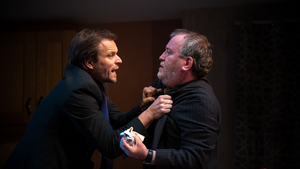Review: THE WEATHERMAN, Park Theatre

![]()
Beezer and O'Rourke share a dilapidated flat in London trying to make ends meet. When Dollar, their landlord, promises to forgo their rent for six months and to give them a weekly allowance in exchange for a small favour, they don't think twice of what their decision will entail.
Suddenly, they have to try to mediate between their conscience and the dangerous world they've accidentally entered. The Park Theatre premieres Eugene O'Hare's The Weatherman, a jarring glimpse into modern slavery and human trafficking. Directed by Alice Hamilton, it doesn't provide answers, preferring to allow audiences merely to peek behind an example of how simple it is to disengage and look away.
Mark Hadfield and Alec Newman are the washed-up, middle-aged men who do their best to survive. The first is an alcoholic who always knows the exact weather forecast for the following day and looks like he's been dragged through a hedge backwards at all times, while the latter is a damaged individual who's been dealt a bad hand by life. They're joined by David Schaal and Cyril Nri as Dollar and Turkey, one of the landlord's seedy and suspicious employees, and Niamh James as Mara.
They deliver a set of exquisite performances that match an earnest and detailed script, with Newman quietly taking over every scene he's in. O'Hare's piece is garrulous, he gives the actors the chance to establish their characters and to start a relationship with each other and the public. This element turns the play's brief and scattered silences into blood-chilling moments of reflection. The duo's unexpected, humorous one-liners and near-constant bickering are balanced by the unrelenting sense of unease given by Hamilton in the run-up to the paranoia that gently envelops the show.
Newman exudes charisma with his quietly sophisticated portrayal: O'Rourke goes from being the picture of failure with uncomplicated savoir-faire-gone-bad to being ridden with guilt and shame for his actions. As his friend, Hadfield is a boisterous and dramatic drunk who's easily pulled into the scheme as a dim accessory. There's sparkling chemistry in their scenes and, whether they're squabbling about Beezer's drinking problem or evaluating the hazards of their venture, it's curious to watch on as they understand the impossibility to extricate themselves from the situation.
Schaal single-handedly brings a chilling atmosphere to the stage. In direct contrast to the other performers, he stands tall and proud in his sharp suit and expensive watch as he patronises each of them differently and exerts his authority with subtle decisiveness. He is imposing and cruel, monopolising the conversation and altering the vibe with a sideways glance or a change in posture.
Hamilton moves her actors with angry distress, dissecting their self-conscious and alarming decisions and presenting the issue with sensitivity and assertiveness. She empathises with the two men while at the same time offering a honed critique on compromise, morality, decency, and integrity. O'Rourke points out that even if they didn't agree to the "business proposal" somebody else would have taken the girl in and her well-being might have been even more compromised.
The director sustains O'Hare's inclination to refusing to highlight a solution to the problem while at the same time making forthright directorial decisions that locate all the signs that might point to its recognition and address. The Weatherman is ultimately permeated with discomfort and disheartenment. Its larger than life and immediately appealing characters make drastically negative decisions that they can't recover from, shrouded by a bleak society that makes it seem impossible that anything could ever change.
The Weatherman runs at Park Theatre until 14 September.
Photo credit: Piers Foley
Reader Reviews
Videos

